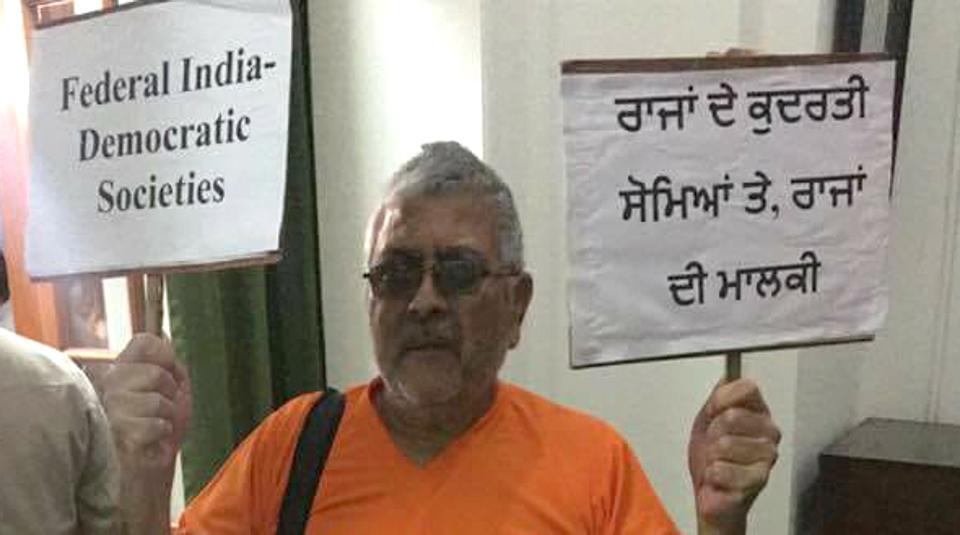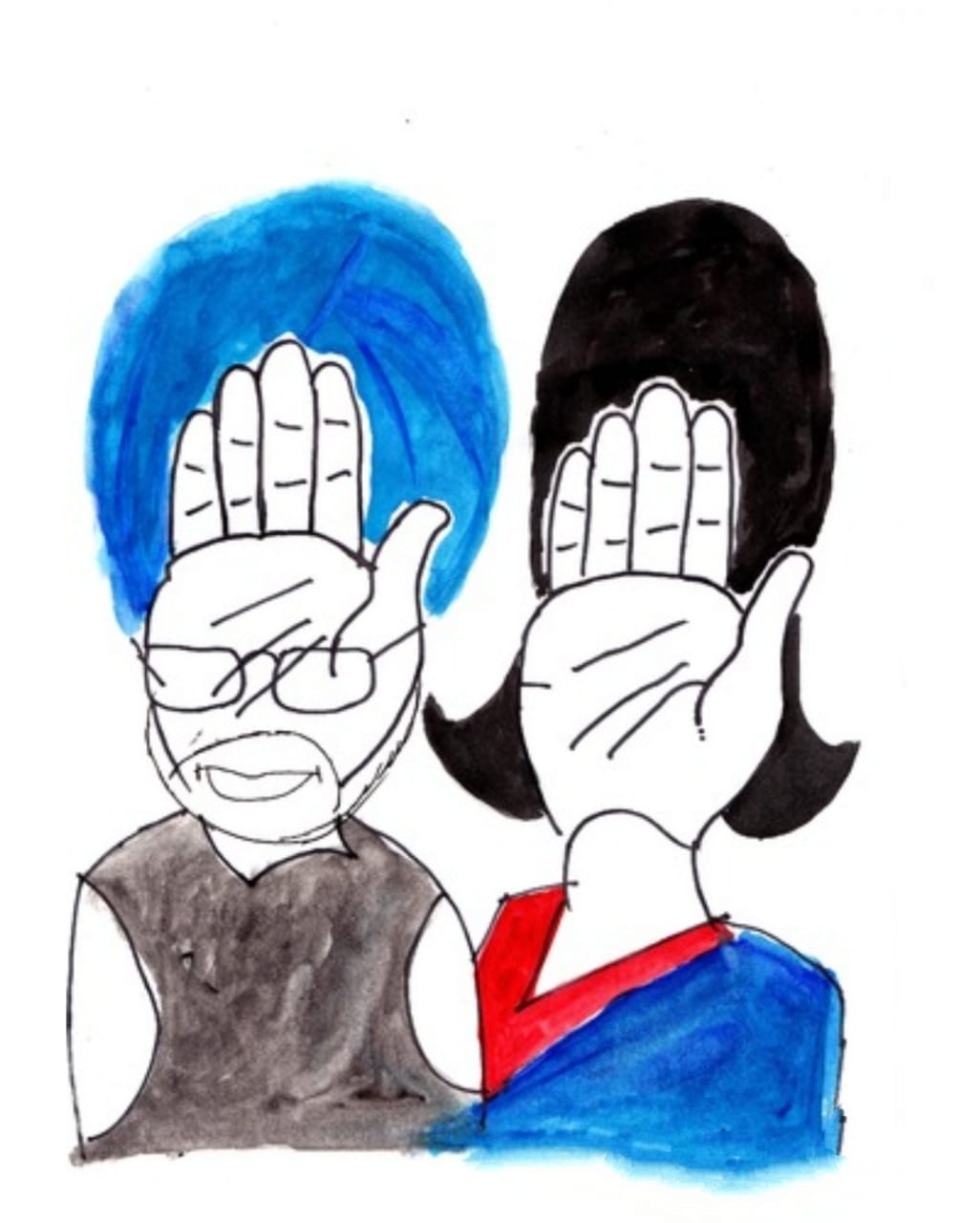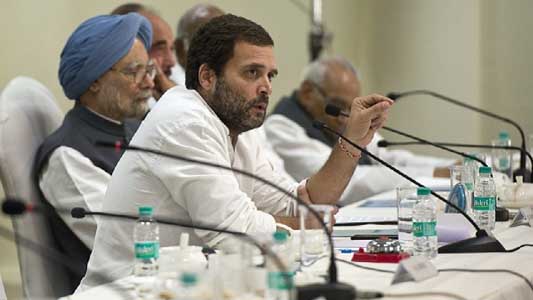The Good Doctor Is Worried About When Democracies Commit Suicide
Dr Dharamvira Gandhi, former Member of Parliament from Patiala, Punjab, estranged from Aam Aadmi Party and known for his independent stances, has now openly issued a clarion call to “the progressives and all the secular-modernist liberals” to vote for the Congress in the upcoming Punjab elections to save democracy. His article, “When Democracies Commit Suicide” has been doing the rounds on social media. Senior Journalist SP Singh makes a considered intervention in the debate, pointing out where the good doctor missed certain nuances in his line of argument. – Editor, WSN.
![Dr Dharamvira Gandhi, former Member of Parliament from Patiala, Punjab, estranged from Aam Aadmi Party and known for his independent stances, has now openly issued a clarion call to “the progressives and all the secular-modernist liberals” to vote for the Congress in the upcoming Punjab elections to save democracy. His article, “When Democracies Commit Suicide” has been doing the rounds on social media. Senior Journalist SP Singh makes a considered intervention in the debate, pointing out where the good doctor missed […]](https://www.theworldsikhnews.com/wp-content/uploads/2021/12/Dharamvir-gandhi-360x266.jpg)
D R DHARAMVIRA GANDHI IS AN HONOURABLE MAN who ventured into politics riding the wave of the frustrated in 2014 that sent him to Parliament and catapulted BJP to an unprecedented victory —both phenomena seemingly underlining diametrically opposite politics.
Seven years later, Gandhi, a doctor by profession and a people’s man by nature, is advocating the cause of Congress.
A lesser man would have made that journey through deceit or hypocrisy, or some deal, but Gandhi has trudged an honest path. He turned out to be a man with his own voice in the Kejriwal outfit, in incongruous quality in a party that sees the latter as a vote-magnet messiah.
Dharamvira Gandhi’s pro-Punjab approach, his caste and class analysis, his stance on regional aspirations and federalism, and his commitment to not budge from the line that came from a lifetime of understanding Punjab ran into a wall. Arvind Kejriwal had proven to be a good administrator, unscrupulous compromiser, capable of cutting deals with the devil, and eager to play the nationalist, and dare we say, covert communal card if it meant kowtowing to the baser elements to hog more votes.
Hamid Dabholkar, the son of renowned rationalist and martyr Narendra Dabholkar, had once described the BJP and the Congress as one party being programmatically communal, and the other being pragmatically communal. Kejriwal had little hesitation in fitting into the second slot.
Hamid Dabholkar, the son of renowned rationalist and martyr Narendra Dabholkar, had once described the BJP and the Congress as one party being programmatically communal, and the other being pragmatically communal. Kejriwal had little hesitation in fitting into the second slot.
Gandhi’s antipathy to the BJP is known. His frustration with the Shiromani Akali Dal is understandable, given his lifelong flirtation with the Left that sees communalism in the neighbourhood Nishan Sahib and smells militancy in the hordes of Sikh youth riding on trolleys shouting Bole So Nihal along the way.

The fact that the Kisan Andolan kept Gandhi at bay, scoffing at his presence at Singhu Border and refusing to allow him to even address the gathering on the pretext that he was associated with a political party, could have not hurt Gandhi. The Sanyukt Kisan Morcha’s decision to repeal the MP on account of non-existent ties to AAP was ill-informed at best, malafide at worst, but it certainly did not endear Gandhi to the farmer bodies’ amalgamation.
Gandhi, to the best of our understanding, remained sympathetic to the cause, however, but he had more nuanced views that went beyond the three controversial farm bills. An aggressive Andolan often runs roughshod over nuances; so Gandhi became a victim of indifference. Not everyone takes Auden’s advice -If equal affection cannot be/Let the more loving one be me. Gandhi certainly did not.
As a result, when elements from the 32-member SKM formed a political party with the cleverly contrived name of Sanyukt Samaj Morcha, it broke the camel’s back for Gandhi. He could no more remain silent, watching the arena and still remaining aloof.
That’s not Dharamvira Gandhi.
Gandhi is a man of words – someone who formulates his stances, gives words to his thoughts, writes an article.
This time, Gandhi has written a missive. He did not want to be seen as a man who kept mum when Punjab was drowning in a clangourous clamour of the self-proclaimed righteous.
Among the available choices — a Dalit CM-led gaggle; a Navjot Singh Sidhu-led throng of the challengers; a Kejriwal-led guarantee-dishing swarm; a clowder of Amarinder Singh-Sukhdev Singh Dhindsa-Amit Shah politics; a Shiromani Akali Dal that has moulded the entire party into the superimposed images of Parkash Singh-Sukhbir-Harsimrat-Bikram Majithia; and lastly, the gaggle that thinks it needs a random word sandwiched between “Sanyukt” and “Morcha” to become acceptable to the people of Punjab — Gandhi needed to cast his vote and weight.
Dharamvira Gandhi has gone out on a limb and chosen the Congress.

In his “The Early History of the Typewriter,” Charles E. Weller describes the standard typing drill phrase: “Now is the time for all good men to come to the aid of the party.” Worldwide, wire news agencies use the phrase to open their services in the morning.
Punjab is drowning in a clangourous clamour of the self-proclaimed righteous, and Dharamvira Gandhi needed to cast his vote and weight.
The good Gandhi has opened his cards by coming to the aid of his newly-chosen party. Whether he will eventually join it is his choice, and he has every democratic right to opt for that. As of now, he has thrown his weight behind it, telling the people of Punjab to save democracy by voting for Congress that, he thinks, “is trying to emerge under the leadership of the young brigade.”

His appeal is aimed at “all the progressives and all the secular-modernist liberals”. Clearly, Gandhi, in realising “the epochal importance” of this struggle to save democracy from an onslaught by the Hindutva forces, has convinced himself that Congress is the answer.
Gandhi seemingly does acknowledge that the party of the freedom struggle had been decaying and was full of unscrupulous politicians, but opines that its one part “is fighting against another part.”
He teaches Punjabis who to vote for, because he says he knows. “I am saying all this because I should know.” He talks about how the current rulers have mopped up “lakhs of crores”, prices of petrol, diesel and gas, the corporate capital loot, bank frauds, and says, “We are all to blame.”
His advocacy of the Congress comes from an understanding that within the Grand Old Party, “a young brigade is trying to occupy the left-of-centre space in the mainstream political spectrum.”
It is not without deliberate application of mind that Dharamvira Gandhi’s forceful missive does not even once use the word “Sikh” or “caste”. The first one would have ostensibly rendered tainted his argument as “communal” and the second would have made him “parochial”.
It is not without deliberate application of mind that Dharamvira Gandhi’s forceful missive does not even once use the word “Sikh” or “caste”. The first one would have rendered tainted his argument as “communal” and the second would have made him “parochial”.
But the more criminal omission is Gandhi’s considered decision of not putting any onus upon the Congress to grapple with its horrendous past. Gandhi omits to question Congress on why it has failed to squarely respond to the public discourse on two major crimes in history: the imposition of Emergency and the attack on Sri Darbar Sahib.
Dharamvira Gandhi is creating a narrative: Democracy is under attack. The BJP is a dangerous force that will sink Indian democracy. AAP is in cahoots with ultranationalists. Farmer outfits have a poor understanding of politics and are even lesser informed by history. Congress has a commitment to fight against hegemonic, corporate, Hindutva and anti-democratic forces. So, vote Congress. This is your sole left-of-Centre choice.
Yet, Gandhi fails to harmonise his narrative with somewhat tougher questions. He avoids putting Congress in the dock for the very same crimes that he wants/expects it to fight: fanning hegemonic, corporate, Hindutva and anti-democratic forces.
In a nutshell, is Gandhi telling us to vote for the pragmatically communal to defeat the programmatically communal? Is he asking us to choose the small looters over more efficient robbers? Is he pleading for the cause of those who impose a declared Emergency apropos those who engulf the country with an undeclared one?
Is that all a good man coming to the aid of a party has to offer Punjab?
Gandhi, I believe, is a good man. He means well. Perhaps it is his desperation that he is seemingly forced to choose a lesser evil. But what is preventing him from putting some pressure on his choice to do some self-accounting?
In a nutshell, is Gandhi telling us to vote for the pragmatically communal to defeat the programmatically communal? Is he asking us to choose the small looters over more efficient robbers? Is he pleading for the cause of those who impose a declared Emergency apropos those who engulf the country with an undeclared one?
The logic of moral discourse cannot shun morality for practicality. The idea that all the sins of one side be called out and the unethical acts of the other be overlooked is a worn-out one.
Spare me the lecture about Sonia Gandhi had said some reconciliatory words about Operation Bluestar, and Manmohan Singh uttering some touching words about anti-Sikh pogroms. I would not feel very comfortable in reminding you that Narendra Modi, too, came fairly close to regretting what happened on his watch in Gujarat.
Vacuous narratives are no replacement for the much more serious task of setting the record straight, joining a public discourse, applying correctives, and executing justice. Congress has not done that with the country, and certainly not with Punjabis, least of all with the Sikhs.
Dharamvira Gandhi doesn’t want to weigh down his new party of choice with such an onerous burden. His love for the “young brigade” reeks of adolescent innocence — and I mean it in the purest sense of adolescent love.
If the future of Punjab depends on Channi-Sidhu, and Indian democracy is to be saved by freeing these men from the burden of their and their party’s past, then, pray, what is it that we are saving?
A “young brigade” that cannot question a Ravneet Singh Bittu’s credentials and has no compunction in standing with hands folded before the samadhi of late CM Beant Singh, a “young brigade” that can make its peace with a Rana Gurjit Singh in the Cabinet but does not come out all guns blazing for a persecuted Sukhpal Singh Khaira, a “young brigade” that can do chest-thumping at appointing a DGP but cannot tell its central honchos to dwell in any detail about the party’s rear-view-mirror analysis of the events of 1984, a “young brigade” afraid of calling out the sins of those within the ranks, is not one for which a Gandhi must fight this hard.
Gandhi must come to the aid of the party — and he can do that by asking the party to square up to the challenge and lay it all out. Gandhi knows better. He is a keen student of history.
Gandhi must come to the aid of the party — and he can do that by asking the party to square up to the challenge and lay it all out. Gandhi knows better. He is a keen student of history.
He knows that the road to Ayodhya passed through episodes like opening the locks of a disputed structure; the road to triple talaq and weaponising of the Universal Civil Code row went through an idiotic and communal approach to the Shah Bano episode; the road to break up of Jammu and Kashmir went through the murder of electoral verdicts in 1987 and the GM Shah episodes; the road to militancy was paved by decades of neglect of regional aspirations and painting an entire community as secessionist; the road to Islamophobia was paved by its malafide use of appeasement tactics instead of really working for the empowerment of Muslims, and the road to corporate loot was paved by its policies of opening the floodgates to crony capitalism. Punjabis cannot forget that the tactic to tar agitating farmers Khalistanis was fashioned by those who issued full-page advertisements in newspapers depicting a Sikh taxi driver and posing a question: “Will you send your child to school with him?”
Gandhi has been a foremost champion of federalism; ergo he also knows the role of those who used the Anandpur Sahib Resolution to paint an entire community as “vakhvadis”. I am sure he will contrive some convincing explanation of why his new-found champion of democracy was so comfortable consorting with those who were speaking of Final Solution to the Muslim question?
For a votary of federalism and regional aspirations, it’s strange that Dr Gandhi places his entire hope of saving the ship of democracy on the fragile shoulders of Congress alone. This sweeping aside of the country’s innumerable regional parties – the most positive remnant of our otherwise emaciated democracy – is disingenuous at best, criminal at worst.
And still, I believe that Gandhi’s advocacy of Congress comes from a good place in his heart. Today’s Congress is not the Congress of the 1980s. But historical memories are institutional, as are the crimes. Eventually, institutions square up to them. Congress needs to do that. Dharamvira Gandhi must not let it off the hook because he hates Kejriwal’s Tiranga Parade Party and the gaggle that calls itself Sanyukt-xyz-Morcha.
Given Dr Dharamvira Gandhi’s sagacity, I’m sure he would not have forgotten that his newfound liberal friend and one of the sharpest critics of the Modi government, P Chidambarm had actually proposed to carry out surgical airstrikes using helicopter gunships against so-called Naxalites in the hard-to-reach jungles of Chhattisgarh, Odisha and Jharkhand. That, Dr Gandhi, is how democracies commit suicide.
Gandhi has been a foremost champion of federalism; ergo he also knows the role of those who used the Anandpur Sahib Resolution to paint an entire community as “vakhvadis”. I am sure he will contrive some convincing explanation of why his new-found champion of democracy was so comfortable consorting with those who were speaking of Final Solution to the Muslim question?
Democracy commits suicide when its liberal, left-of-centre claimant to power decides to fight elections in Gujarat on the “development” plank and not on the issue of human rights, Islamophobia and wholesale killings of a minority.
It is easier to vote for Dharamvira Gandhi. It should have been easy to vote for a party to whose aid Dharamvira Gandhi has rushed. He has opted to bring down the bar. We must not reduce the burden of our expectations.
That’s how democracy will be saved in the land of the Gurus. Bole So Nihal-spewing crowd would not communalise that fight, and a bunch of farmers, whether they are contesting in the electoral arena or outside, will only enrich the debate about our and their sins of omission and commission. Just as I finished reading Gandhi’s lament about the sinking ship of democracy came the news of the death of EO Wilson, the great Harvard professor who studied ants and explained human behaviour, decoding how our species has a propensity to behave in certain ways and form certain social structures. It will be cheeky of me to recall the good professor’s words, but in a strange way, they’ll help Gandhi to make peace with his position: “It is possible to be unhappy and very adaptive.” (Edward Osborne Wilson (June 10, 1929 – Dec 26, 2021)
Bole So Nihal spewing crowd would not communalise that fight, and a bunch of farmers, whether they are contesting in the electoral arena or outside, will only enrich the debate about our and their sins of omission and commission.
Dharamvira Gandhi is a doctor. He knows how doubt has advanced medical science and the faith that a good doctor can always find a solution with surgical precision is merely a romantic notion. Engage, organise, struggle, and find your own correct answer, because democracies commit suicide when we turn debates into binaries and claim monopoly over the sublime truth.

One thought on “The Good Doctor Is Worried About When Democracies Commit Suicide”